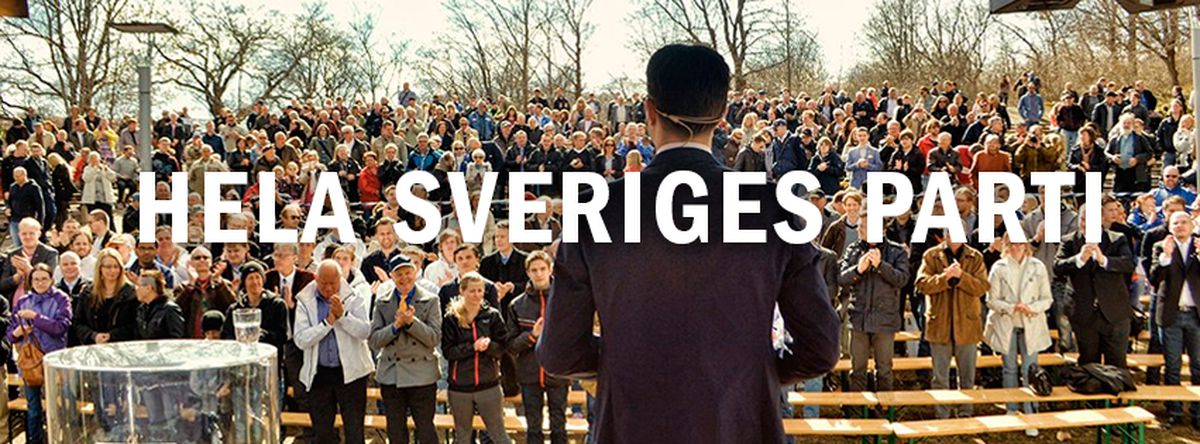
Rise of the Extreme Right in Sweden
Published on
Translation by:
Kait BolongaroAfter the victory of the Social Democrats in the Swedish parliamentary elections, party leader Stefan Löfven announced he would enter negotiations with both left-wing and conservative parties. He rejected offhand a coalition with the Sweden Democrats. The moderate parties must join forces to counter the rise of the right-wing populists.
Neue Zürcher Zeitung - Switzerland: Moderate parties must join forces
All of Sweden's political camps must join forces to counteract the new strength of the right-wing populist Sweden Democrats, the liberal-conservative daily Neue Zürcher Zeitung urges: "Unlike in Norway, where the right-wing populists have been governing together with the conservatives for a year, all the parties have refused to cooperate with the Sweden Democrats. If they want to prevent the latter from achieving even better results in four years' time, they must swiftly tackle the problems posed by integration and the labour market. These include joblessness among immigrants, which is almost twice as high as among native Swedes, as well as linguistic integration and the need for special teachers and extra funding asserted by schools in immigrant neighbourhoods. To minimise the influence of the Sweden Democrats, what is needed is cross-party cooperation." (16/09/2014)
Göteborgs-Posten - Sweden: Sweden needs a better integration policy
If the right-wing populist Sweden Democrats (SD) were able to secure 12.9 percent of the vote in Sunday's elections, thus more than doubling their share of the vote, it is above all due to widespread dissatisfaction with the country's integration policy, the liberal daily Göteborgs-Posten comments: "As a result of the unrest in many parts of the world, immigration to Sweden [in recent years] has been comparatively high. At the same time there's not enough housing or employment opportunities. As a result, people are marginalised and enclaves form on the outskirts of the big cities which seal themselves off from the rest of society. This creates dissatisfaction among the majority population and gives xenophobic forces like the SD a boost. ... If we want to reverse this trend, the other parties must take strong, concerted steps to improve integration and create a society in which there is just an 'us', a Sweden in which everyone has the chance to participate. In such a society the SD wouldn't have a chance." (16/09/2014)
Der Standard - Austria: Inequality biggest challenge for Löfven
The new Swedish government led by the Social Democratic election winner Stefan Löfven must take action to balance out the growing inequality of recent years and create a fairer country, the left-liberal daily Der Standard's believes: "The ex-metal trade unionist is a pragmatist from whom businesses have nothing to fear. If he manages to get one of the centre-right parties on board, Sweden may strike out on innovative paths once more to strengthen the social welfare system and boost equal opportunities without driving up taxes any further. We must hope for a success not just for Sweden, but for all the industrial nations that face similar problems - including Austria. But the question of what can be done to stop the gap between rich and poor growing in a globalised economy may prove too much of a challenge for Sweden's social technocrats." (16/09/2014)
Il Sole 24 Ore - Italy: Advance of the Eurosceptics continues
The success of the Sweden Democrats, like that of the Alternative for Germany party on the same day, shows that Eurosceptics continue to gain ground in Europe, the liberal daily Il Sole 24 Ore warns: "There are no national elections in which nationalistic, xenophobic, Eurosceptic and anti-euro parties have failed to make progress. Their backwards-looking message first gains the support of a minority, who then becomes the majority. That happened in France with the Front National, in the UK with Ukip, in Denmark with the Danish People's Party. All of them emerged as winners from the European elections in May. Their successes have been played down on the grounds that the European elections are a sort of protest vote in which people do not act as responsibly as they do in national elections. Think again. This tide is not ebbing, it's swelling. The more people play down this danger - as if denying the obvious was enough to change reality - and the more they refuse to deal seriously with the challenge posed by the growing popular unease, the more fractured Europe becomes." (16/09/2014)
Translated from Extrême-droite en Suède : le troisième type



